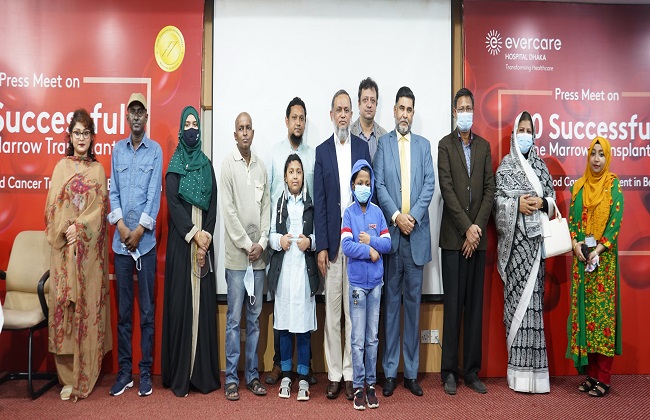
Evercare Hospital Dhaka, the first JCI-accredited hospital in Bangladesh, announced at a press meet that they have successfully completed their 50th bone marrow transplant, said a press release.
With this, they now have a record of conducting the highest number of allogeneic BMTs in the country.
With a dedicated BMT unit and a leukemia unit, Evercare Hospital Dhaka is fully equipped to tackle different kinds of leukemia using autologous and allogeneic BMT with full match and half match (Haplo). Furthermore, the hospital has a stem cell processing lab; a Cryopreservation facility; outpatient and inpatient procedure facility; an in-house molecular diagnostic facility which provides fast and accurate diagnosis; BMT beds with central oxygen supply, HEPA Filter and a system for reverse osmosis water purification. It has a molecular lab which uses state-of-the-art technology of Flow Cytometry to diagnose the specific type of cancer. Services like subtyping, FLAER-based PNH, immune-histochemistry and PET-scan are available to make a quick and correct assessment of the patient’s condition.
Early diagnosis and planning of BMT procedures is crucial to the treatment of leukemia. Therefore, topnotch treatment planning tests like MRD and IHC tests are used to monitor the effectiveness of the treatment, and adapt for necessary changes.
Dr Ratnadeep Chaskar, CEO& MD, Evercare Hospital Dhaka, said, “We are the first private hospital in the country to bring the advanced equipment required for BMT. With a fully equipped leukemia unit, BMT unit and the treatment planning processes, we hope to help more patients who are fighting the painful fear of losing their lives to cancer.”
Dr. Arif Mahmud, Deputy Director of Medical Services, Evercare Hospital Dhaka, said, “We have the best facilities for BMT treatment in Evercare Hospital Dhaka. Due to this development, patients don’t need to seek BMT treatment abroad anymore.It is much more cost-effective to do it in the country, and our success rates are as good as developed countries.”

